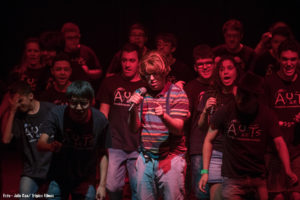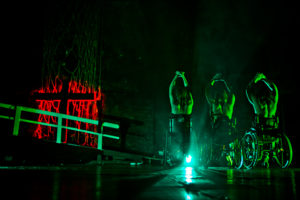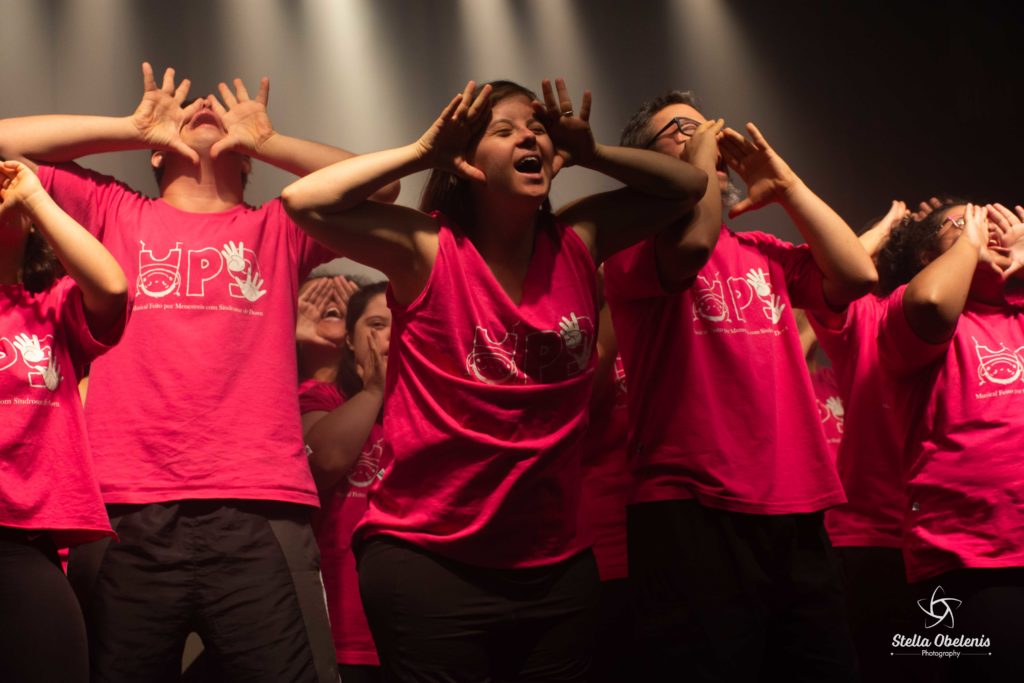São Paulo – São Paulo-based Oficina dos Menestréis, a musical theater company that gives open courses with its own methodology based on reflex and intuition, gave a workshop to teachers from Saudi Arabia in late 2021. The company created in 1993 by actors Deto Montenegro and Marco André Brandão de Magalhães was invited by entrepreneur Carolina Andraus to train 38 Arab male and female teachers that teach young people with disabilities.

“Andraus was hired by an Arab colleague interested in a pedagogical project for young people with disabilities in public schools in Saudi Arabia. After researching, Andraus found us, but since we didn’t have a pedagogical project back then, we developed a material to meet their needs, including our exercises, the types of plays we do etc. Then we had weekly meetings to approve these materials,” said Evelyn Klein, actress, producer and art educator at the Oficina dos Menestréis.
After the project was approved, the workshop was held for the first time abroad in Arab country, in two stages: The group stayed a week in Dammam, where they gave an online training for two hours a day to teachers from three cities in Saudi Arabia (Dammam, Riyadh and Jeddah). After five days of online training, the workshop team went to Riyadh to meet teachers in person on a stage. Then they gave five hours of class a day during five days, where the Arab educators took the exercises they had learned.
She says that the stage was divided into two sections, one for the men and one for the women, and that they had five very rich days of information and knowledge exchange. Theater is not widely spread in Saudi Arabia. “We started from the very basics: What is a stage, lightning, and more elaborate exercises with a tableau-based dramaturgy,” she says. The latter is used by the group for shows with people with Down syndrome and autism.

In the last day in Saudi Arabia, the Brazilians performed with the Saudi teachers. “It was a very special for us to participate in this project, as we were present in a moment of cultural openness in Saudi Arabia. We saw the power of women, and although they have a religious aspect that is very different from ours, we saw that they are great leaders. Our project was entirely led by Arab women,” she said.
Then the Brazilians had other three online meetings with a 45-day interval between them. During these meetings, the Arab teachers told how they applied the Menestréis method with children with disabilities, asked questions, discussed the good and bad parts, and the Brazilians shared the ideas they had from working with children with Down syndrome in Brazil. As a way to continue the training, the Saudi teachers did an internship in the company, participating in the activities of ten performances of children with disabilities.
What does the Oficina dos Menestréis do
In Brazil, Oficina dos Menestréis works in two fronts: the regular courses for paying students, focused on children and teenagers, and social projects, with musical theater courses for people with disabilities, senior citizens, and young people with fewer opportunities.
They work with five different social projects. The first one was first held in 2003 with a group of wheelchair users and the visually impaired, with inclusive musical theater lessons. Three years later came the Projeto Maturidade, to value the elderly and broaden their social inclusion through art. The third social project Up was created for children with Down syndrome.
Then came the Juntos project for young people with fewer opportunities, and in 2012 the company created Aut for young people and adults in the autism spectrum. At the beginning of the projects, the students are presented with an art training tailored for them. In the second stage of the course a musical play is prepared, and the third phases sees the performances themselves.

“The Up project is adapted to their needs. [People with Down syndrome] have trouble communicating but burst with affection, which makes all the difference in the work. For this project, we didn’t prepare close-ended scripts because we knew they would improvise. People with autism are very pragmatic and rarely make mistakes. We worked on being more flexible, on being able to make mistakes and improvise,” Klein said.
“The improvisation exercises were a little difficult at the beginning, but they managed to perform them in a playful way. As we worked on a daily basis, they understood what we wanted from them, and we were flexible with each other,” Klein said.
In addition to the headquarters in São Paulo, the company is present in some schools and clubs in São Paulo, Ubatuba, and the ABC region. They also have a project in Palmas, Tocantins, and they used to have a project in Brasília, Distrito Federal, that went on for seven years.
Report by Rebecca Vettore specially for ANBA
Translated by Guilherme Miranda




